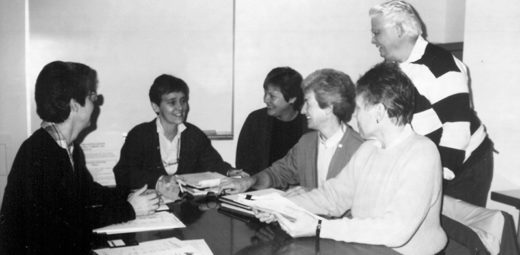
Mar 25A Bold Start
Many of the Sisters in the region had existing relationships because they attended the College of Sister Formation together. So when they arrived at the Intercommunity Conference on Housing in 1990, seeing the devastation that rising homelessness was doing to families at that time, their main question was: What can we do together about this?
The Sisters who attended the conference had a practical view: It’s entirely possible that the families who were struggling with the rising costs of housing may never secure the type of employment that would make them able to afford housing. How instead can we make sure that children, regardless of circumstance, had a stable home? They left that conference with a mission. Respond to the children, who at that time made up a third of people experiencing homelessness in Washington — by developing permanently affordable housing with services for children and their families.
They got started right away. Four communities of Women Religious — Sisters of Providence, Sisters of St. Joseph of Peace, Sisters of St. Dominic of Tacoma and Adrian Dominican Sisters — got to work on a new organization: Intercommunity Housing, a name reflective of the communities who joined together. Soon after, they found their first director, Linda Moore. It was, as Sr. Charlotte Davenport called it, a bold start. Communities committed what resources they had, including several Sisters who worked directly in staff roles. “We were keeping bills in a shoebox,” Sr. Judy Byron laughed.
They founded a board with a unique ethos: their reports will be infrequent and brief in order to spend time “doing” rather than “planning on doing” or “reporting on doing!” Members of the four communities served on the founding board, and they included lay people who brought expertise and wanted to combine efforts. Early on, Intercommunity Housing became part of Mercy Housing, Inc., a larger Women Religious sponsored housing ministry to aggregate resources and expertise. This was crucial in the early days of the Low Income Housing Tax Credit, a federal program that started in 1987, and is a contributing source for most of the affordable housing that exists today. As Sr. Judy puts it, “Collaboration is in our DNA.”
Linda Moore, the director, was described as a go-getter who gave them all the confidence to enter the affordable housing sector. Family Tree Apartments in Everett, WA, was their very first housing development. Completed in 1993, Family Tree’s design reflected their philosophy that services were a crucial part of affordable housing to make it truly work for families and included an onsite day care. Soon afterward, they completed Evergreen Vista in Olympia, WA. Again, it included space for childcare and early learning programs. More than 250 households continue to call these two early communities home.
Sisters of the Holy Names of Jesus and Mary joined in 1995 and became the fifth founding community of Intercommunity Housing. Soon after, the organization acquired or built six affordable family housing communities spanning four counties — providing homes to an additional 380 households.
In 2004, the portfolio doubled in size with the acquisition and preservation of affordability of 30 rural development properties with 900 apartments.
Today, Mercy Housing Northwest owns and operates over 50 affordable apartment communities, which provide housing to more than 5,500 residents.
No related posts.
Stay Up To Date
Get news on Mercy Housing and inspiring stories of change delivered to your inbox.


